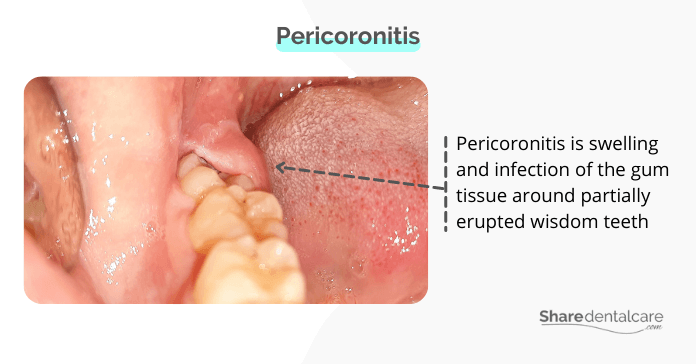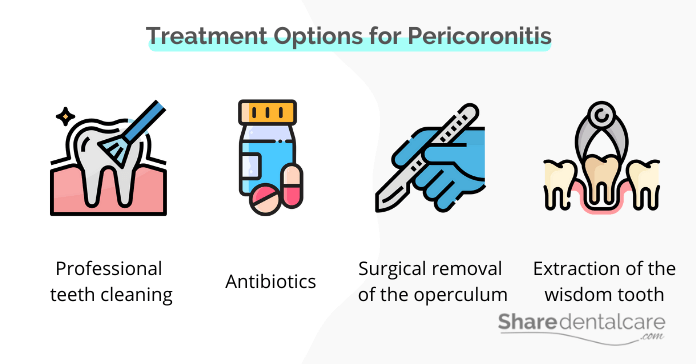Do you have pericoronitis? If so, you’re not alone. This condition is quite common, especially among people who have partially impacted third molars. There are many pericoronitis home remedies that can help ease the symptoms and speed up the healing process. In this blog post, we will discuss the causes of pericoronitis, as well as the home remedy and treatment options.
What is Pericoronitis?
Pericoronitis is swelling and infection of the gum tissue surrounding the third molars (wisdom teeth), especially those that are only partially erupted or not fully visible. The condition is more common in lower wisdom teeth than in the upper ones. The symptoms of pericoronitis include:
- Mild to severe pain
- Swelling
- Tenderness
- Redness
- Difficulty opening the mouth (trismus)
- Discharge of pus. You can read more about a pocket of pus in the gums
- Bad taste in the mouth
- Difficulty swallowing (dysphagia)
- Bad taste in the mouth
- Halitosis (bad breath)
If you are experiencing any of these symptoms, it’s important to see a dentist as soon as possible. While you wait for your appointment, there is a home remedy for pericoronitis that can help ease the symptoms.

Causes of Pericoronitis
Bacteria and food debris can accumulate around the partially erupted wisdom teeth, leading to infection and swelling of the operculum. The operculum is a flap of tissue that covers partially erupted wisdom teeth. When pericoronitis occurs, this flap of tissue becomes irritated and inflamed. You can read more about the operculum covering a wisdom tooth.
Pericoronitis is more common in young adults because their wisdom teeth are usually not fully erupted. In addition, pericoronitis is more common in smokers and people with poor oral hygiene. Several factors can increase your risk of pericoronitis, including:
- Poor oral hygiene
- Smoking and tobacco use
- Partially erupted wisdom teeth
- Vitamin C deficiency
- Hormonal changes during puberty or pregnancy
- Some medical conditions such as diabetes
- Certain medications that cause dry mouth as a side effect
- Suppressed immune system
If you have any of these risk factors, it’s essential to see a dentist regularly so that they can monitor your wisdom teeth and pericoronitis. Also, a home remedy can help prevent the development of pericoronitis.
Home Remedy for Pericoronitis
Periodontitis home remedy doesn’t replace professional dental care, but it can help relieve the symptoms until you can get to the dentist. Pericoronitis home remedy should be performed in addition to professional dental care, not instead of it. Home remedies include:
- OTC pain relievers: Ibuprofen (Advil, Motrin) or acetaminophen (Tylenol) can help reduce pain and inflammation. Here is a list of Over-the-counter pain relievers.
- Warm salt-water rinses: The pericoronitis home remedy involves rinsing the mouth with a saltwater solution. To make the solution, mix one teaspoon of salt in a glass of warm water and rinse your mouth for 30 seconds. Spit the solution out and repeat it several times a day. You can also use an over-the-counter mouthwash to help control the infection and ease the symptoms of pericoronitis.
- Diluted hydrogen peroxide rinses: Hydrogen peroxide can help control the infection. To use this pericoronitis home remedy, mix one-part hydrogen peroxide with two parts water. Rinse your mouth with the solution for 30 seconds and then spit it out. Repeat this several times a day. A stronger concentration can cause irritation, so be sure to dilute it before using.
- Improve your oral hygiene: Brush your teeth twice a day and floss daily. This pericoronitis home remedy will help remove the bacteria and food debris that can accumulate around your wisdom teeth and lead to pericoronitis.
Home remedies can help control the symptoms, but only professional dental care can treat the underlying cause of pericoronitis.
Treatment of Pericoronitis in Conjunction with Home Remedy
The treatment of pericoronitis usually involves a combination of professional dental care and home remedies. In most cases, pericoronitis will go away with professional teeth cleaning and home remedy. However, you may need further treatment if the pericoronitis is severe or does not heal.
Some of the pericoronitis treatments that your dentist may recommend include:
- Professional teeth cleaning: This pericoronitis treatment involves removing the bacteria and food debris that have accumulated around your wisdom teeth.
- Antibiotics: If the pericoronitis is severe, your dentist may prescribe antibiotics to help control the infection.
- Surgical removal of the operculum: In some cases, pericoronitis may require surgical removal of the operculum (operculectomy). This pericoronitis treatment is typically reserved for severe cases that do not respond to other treatments.
- Removal of the wisdom tooth: If the pericoronitis is severe and does not respond to other pericoronitis treatments, your dentist may recommend the removal of the wisdom tooth.

Pericoronitis Home Remedy – Conclusion
Pericoronitis is the inflammation of the tissue surrounding the third molars. It usually occurs in molars that are partially impacted, or not fully erupted. Bacteria and food debris accumulate around the tooth, which leads to inflammation and swelling of the operculum.
The pericoronitis home remedy can help control the infection and ease the symptoms. However, pericoronitis home remedy should be performed in addition to professional dental care, not instead of it. If the pericoronitis is severe or does not respond to other pericoronitis treatments, your dentist may recommend the removal of the wisdom tooth.
See a dentist if you think you may have pericoronitis. Home remedies can help control the symptoms, but only professional dental care can treat the underlying cause of pericoronitis.